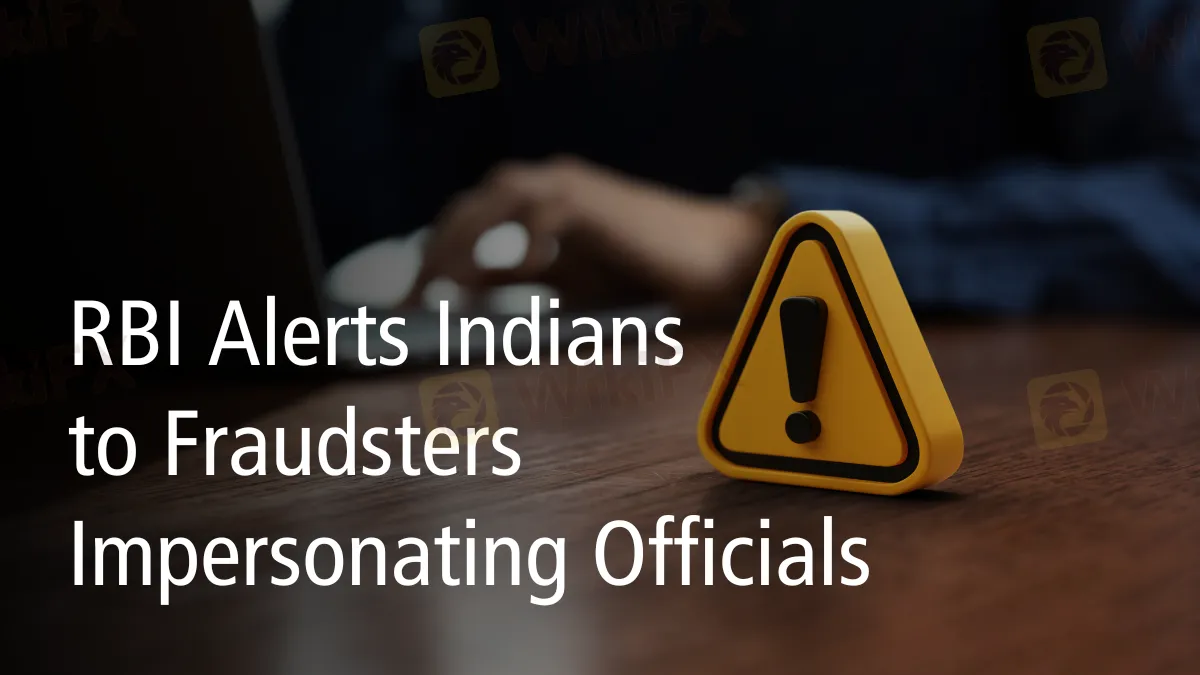简体中文
繁體中文
English
Pусский
日本語
ภาษาไทย
Tiếng Việt
Bahasa Indonesia
Español
हिन्दी
Filippiiniläinen
Français
Deutsch
Português
Türkçe
한국어
العربية
RBI Alerts Indians to Fraudsters Impersonating Officials
Abstract:RBI warns Indians about fraudsters posing as officials, using fake documents and intimidating tactics. Stay alert to avoid falling victim to these scams.

The Reserve Bank of India (RBI) has issued a severe warning to the public over the rising threat of fraudsters impersonating its personnel. These fraudsters utilize sophisticated strategies to trick unwary people and organizations, sometimes impersonating RBI workers or government officials to obtain money under false pretenses.
The RBI has discovered that these fraudsters employ forged RBI letterheads, email addresses, and other official-looking papers to persuade their victims of their credibility. Their basic strategy is approaching small and medium-sized firms by pretending to provide lucrative government contracts or initiatives. To guarantee these phony transactions, the scammers want a “security deposit,” which they promise would result in big payouts in the future.
In addition to attacking companies, these imposters entice people with promises of lottery winners, cash transfers, international remittances, and government programs. The RBI has said that it does not send emails or communications involving the distribution of lottery money or any similar promotions. The public is advised to be wary of any message that promises quick money or asks for personal or financial information.

The RBI has also highlighted a particularly concerning trend: fraudsters use threatening techniques to compel their victims. These crooks often impersonate RBI officials and call victims, threatening to shut down or deactivate their bank accounts if they do not meet their demands. The requests might include providing personal information, account information, or one-time passwords (OTPs). In certain circumstances, users are forced to install unapproved and unverified programs via links given by scammers.
The RBI has also advised against cases in which fraudsters impersonate government officials or RBI personnel, accusing victims of participation in illicit activities such as money laundering, counterfeiting, or suspicious financial transactions. These threats are intended to cause fear and drive victims to comply.
Furthermore, some fraudsters have been caught claiming accreditation or registration with the RBI to market unlicensed digital lending applications and other questionable financial services. The RBI has urged the public not to trust any websites or applications claiming to be RBI-accredited without sufficient verification.
In its statement, the RBI strongly advised the people to be watchful and not fall victim to these fraudulent schemes. The central bank continues to monitor these operations and is dedicated to safeguarding the people from financial fraud.
Stay protected! For more on this and other financial safety updates, visit the WikiFX News page for the latest insights.

Disclaimer:
The views in this article only represent the author's personal views, and do not constitute investment advice on this platform. This platform does not guarantee the accuracy, completeness and timeliness of the information in the article, and will not be liable for any loss caused by the use of or reliance on the information in the article.
Read more

The Daily Habits of a Profitable Trader
Every professional trader follows a structured approach to ensure they are well-prepared, disciplined, and able to seize opportunities with confidence. Whether you are a seasoned investor or an aspiring trader, adhering to a robust daily checklist can significantly enhance your performance. Use this checklist to check if you are a qualified trader

Authorities Alert: MAS Impersonation Scam Hits Singapore
MAS scam alert: Scammers impersonate officials, causing $614K losses in Singapore since March 2025. Learn how to spot and avoid this impersonation scam.

Billboard Warns of Crypto Scams Using Its Name – Stay Alert!
Billboard warns against fake crypto scams using its brand. Learn how to spot fraud and protect yourself from fake promotions.

Rising WhatsApp Scams Highlight Need for Stronger User Protections
UK consumers lose £2,437 on average to WhatsApp scams. Revolut demands stricter verification and AI monitoring to combat rising fraud on Meta platforms.
WikiFX Broker
Latest News
The Withdrawal Trap: How Scam Brokers Lure Victims into Paying More
FCA to Investors: Think Twice Before Trusting These Brokers
Trump\s tariffs: How could they affect the UK and your money
Trump gambles it all on global tariffs he\s wanted for decades
TradingView Brings Live Market Charts to Telegram Users with New Mini App
Trump tariffs: How will India navigate a world on the brink of a trade war?
Interactive Brokers Launches Forecast Contracts in Canada for Market Predictions
Authorities Alert: MAS Impersonation Scam Hits Singapore
Stocks fall again as Trump tariff jitters continue
IG Group Acquires Freetrade for £160M to Expand UK Investment Market
Currency Calculator







